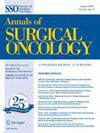投稿信息
稿件收录要求
The Annals of Surgical Oncology (ASO) promotes high-quality surgical oncology management by communicating advances in research and education that are relevant and valuable to the provision of contemporary multidisciplinary care for patients with cancer.
The official journal of the Society of Surgical Oncology (SSO) and the American Society of Breast Surgeons, ASO is the journal of choice of surgical oncologists worldwide regarding surgical oncology research and education.
The mission of the Annals of Surgical Oncology is to serve its readers by 1) representing and advancing the profession of surgical oncology throughout the nation and the world; 2) promoting the highest quality multidisciplinary patient care and practice management; 3) providing relevant cancer education and research training materials using print and electronic media; 4) promoting clinical and translational cancer research, with an emphasis on clinical trials; 5) facilitating the career development of surgical trainees and their transition into academic and community-based practice; and 6) promoting public policy and patient advocacy issues related to surgical patient with cancer.




